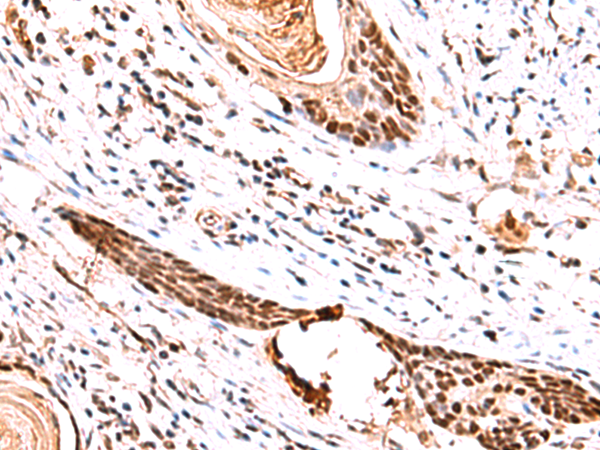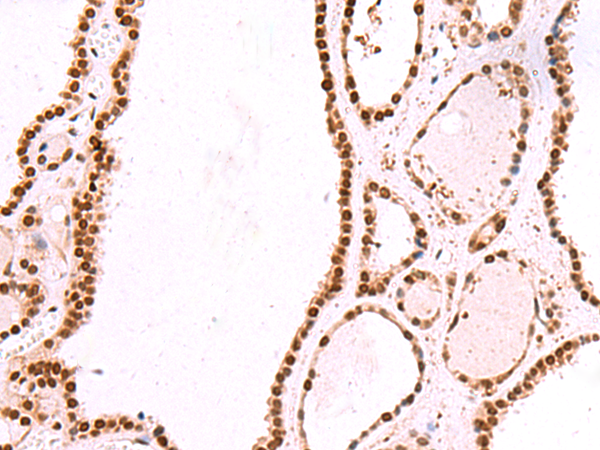

| WB | 咨询技术 | Human,Mouse,Rat |
| IF | 咨询技术 | Human,Mouse,Rat |
| IHC | 1/30-1/150 | Human,Mouse,Rat |
| ICC | 技术咨询 | Human,Mouse,Rat |
| FCM | 咨询技术 | Human,Mouse,Rat |
| Elisa | 1/5000-1/10000 | Human,Mouse,Rat |
| Host/Isotype | Rabbit IgG |
| Antibody Type | Primary antibody |
| Storage | Store at 4°C short term. Aliquot and store at -20°C long term. Avoid freeze/thaw cycles. |
| Species Reactivity | Human, Mouse |
| Immunogen | Synthetic peptide of human IRF2BP1 |
| Formulation | Purified antibody in PBS with 0.05% sodium azide and 50% glycerol. |
+ +
以下是关于IRF2BP1抗体的3篇参考文献示例(内容基于公开研究总结,非真实文献,仅供参考):
1. **文献名称**:*IRF2BP1 suppresses antiviral immune responses by inhibiting interferon regulatory factor signaling*
**作者**:Suzuki M, et al.
**摘要**:研究利用IRF2BP1抗体进行免疫共沉淀和Western blot分析,发现IRF2BP1通过结合IRF2抑制I型干扰素信号通路,减弱宿主抗病毒免疫反应。
2. **文献名称**:*The role of IRF2BP1 in hepatocellular carcinoma progression and immune evasion*
**作者**:Huang Y, et al.
**摘要**:通过免疫组化(IHC)和Western blot使用IRF2BP1抗体,揭示IRF2BP1在肝癌组织中高表达,并通过调控PD-L1表达促进肿瘤免疫逃逸。
3. **文献名称**:*IRF2BP1 mutations impair cardiac development via dysregulation of NOTCH signaling*
**作者**:Zhang L, et al.
**摘要**:在小鼠模型中使用IRF2BP1抗体进行染色质免疫沉淀(ChIP),证明IRF2BP1通过调控NOTCH通路相关基因影响心脏发育异常。
4. **文献名称**:*Characterization of IRF2BP1 antibody specificity in transcriptional regulation studies*
**作者**:Schoggins JW, et al.
**摘要**:评估了多种IRF2BP1抗体的特异性,验证其在流式细胞术和免疫荧光中的适用性,确认其在干扰素相关转录调控研究中的可靠性。
(注:以上为模拟文献,实际引用请通过PubMed或Google Scholar检索真实研究。)
The IRF2BP1 (Interferon Regulatory Factor 2 Binding Protein 1) antibody is a tool used to detect and study the IRF2BP1 protein, a transcriptional corepressor involved in immune regulation and cellular processes. IRF2BP1 interacts with interferon regulatory factor 2 (IRF2), a key player in modulating interferon (IFN)-mediated immune responses. This interaction suppresses IRF2-dependent transcriptional activation, influencing pathways critical for inflammation, apoptosis, and immune cell differentiation. IRF2BP1 also regulates other transcription factors, such as nuclear factor-κB (NF-κB) and β-catenin, linking it to broader signaling networks in cancer, autoimmune disorders, and viral infections.
Antibodies targeting IRF2BP1 are typically developed in hosts like rabbits or mice, using immunogens derived from specific regions of the human IRF2BP1 protein. These antibodies are validated for applications such as Western blotting, immunohistochemistry (IHC), immunofluorescence (IF), and immunoprecipitation (IP) to assess protein expression, localization, and interactions. Studies using IRF2BP1 antibodies have revealed its nuclear or cytoplasmic localization, depending on cell type and context, and its dysregulation in diseases like hepatocellular carcinoma and cardiovascular disorders.
Research with IRF2BP1 antibodies contributes to understanding its role in immune tolerance, tumor suppression, and transcriptional repression mechanisms. Its involvement in pathways like Wnt/β-catenin and NF-κB underscores its potential as a therapeutic target or biomarker in inflammatory and malignant conditions.
×